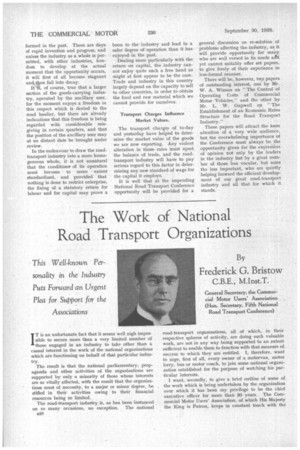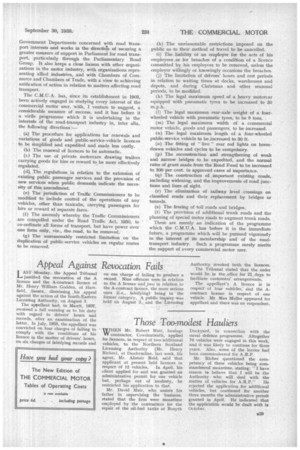The Work of National Road Transport Organizations
Page 42

Page 43

If you've noticed an error in this article please click here to report it so we can fix it.
By
Frederick G. Bristow
C.B.E., M,Inst.T.
IT is an unfortunate fact that it seems well nigh impossible to secure more than a very limited number of those engaged in an industry to take other than a casual interest in the work of the national organizations which are functioning on behalf of that particular industry.
The result is that the national parliamentary, propaganda and other activities of the organizations are supported by only a minority of those whose interests are so vitally affected, with the result that the organizations must of necessity, to a major or minor degree, be stifled in their activities owing to their financial resources being so limited.
The road-transport industry is, as has been instanced on so many occasions, no exception. The national e28
road-transport organizations, all of which, in their respective spheres of activity, are doing such valuable work, are not in any way being supported to an extent sufficient to enable them to function with that measure of success to which they are entitled. I, therefore, want to urge, first of all, every owner of a motorvan, motor lorry, bus or motor coach, to join some national organization established for the purpose of watching his particular interests.
I want, secondly, to give a brief outline of some of the work which is being undertaken by the, organization over which it has been my privilege to be the chief executive officer for more than 30 years. The Commercial Motor Users' Association, of which His Majesty the King is Patron, keeps in constant touch with the
Government Departments concerned with road transport interests and works in the directioen of securing a greater measure of support in Parliament for road transport, particularly through the Parliamentary Road Group. It also keeps a close liaison with other organizations in the motor industry, with organizations representing allied industries, and with Chambers of Commerce and Chambers of Trade, with a view to achieving unification of action in relation to matters affecting road transport.
The C.M.U.A. has, since its establishment in 1903, been actively engaged in studying every interest of the commercial motor user, with, I venture to suggest, a considerable measure of success, and it has before it a virile programme which it is undertaking in the interests of the road-transport industry in, inter alia, the following directions
• (a) The procedure for applications for renewals and variations of goods and public-service-vehicle licences to be simplified and expedited and made less costly.
(b) The renewal of licences to be automatic.
(c) The use of private motorcars drawing trailers carrying goods for hire or reward to be more effectively regulated.
(€1). The regulations in relatiOn to the extension of existing public passenger services and the provision of new services when public demands indicate the necessity of this amendment.
(e) The jurisdiction of Traffic Commissioners to be modified to include control of the operations of any vehicles, other than taxicabs, carrying passengers for hire or reward at separate fares..
(f) The anomaly whereby the Traffic Commissioners are compelled under the Road Traffic Act, 1930, to co-ordinate all forms of transport, but have power over one form only, viz., the road, to be removed.
(g) The unreasonably restricted limitation on the duplication of public-service vehicles on regular routes to be removed.
(la) The unreasonable restrictions imposed on the public as to their method of travel to be cancelled.
(i) The liability of an employer for the acts of his employees or for breaches of a condition of a licence committed by his employees to be removed, unless the employer willingly or knowingly occasions the breaches. (j) The limitation of drivers' hours and rest periods in relation to waiting times at docks, warehouses and depots, and during Christmas and other seasonal periods, to be modified. (k) The legal maximum speed of a heavy motorcar equipped with pneumatic tyres to be increased to 30 m.p.h.
(I) The legal maximum Tear-axle weight of a fourwheeled vehicle with pneumatic tyres, to be 9 tons.
(m) The legal maximum width of a commercial motor vehicle, goods and passengers, to be increased.
(n) The legal maximum length of a four-wheeled public-service vehicle to be ,increased to 30 ft.
(o) The fitting of " live " rear red lights on horsedrawn vehicles and cycles to be compulsory.
(p) The reconstruction" and strengthening of weak and narrow bridges to be expedited, and the normal rates of grant made from the Road Fund to be increased to 100 per cent. in approved cases of importance.
(q) The construction of important existing roads, including widening, and the improvements of road junctions and lines of sight.
(r) The elimination of railway level .crossings. on classified roads and their replacement by bridges or tunnels.
(s) The freeing of toll roads and bridges.
(t) The provision of additional trunk roads and the planning of special motor roads to augment trunk roads.
These are merely an indication of the programme which the C.M.U.A. has before it in the immediate future, a programme which will be pursued vigorously in the interest of its membership and of the roadtransport industry. Such a programme surely merits the support of every commercial motor user.




























































































